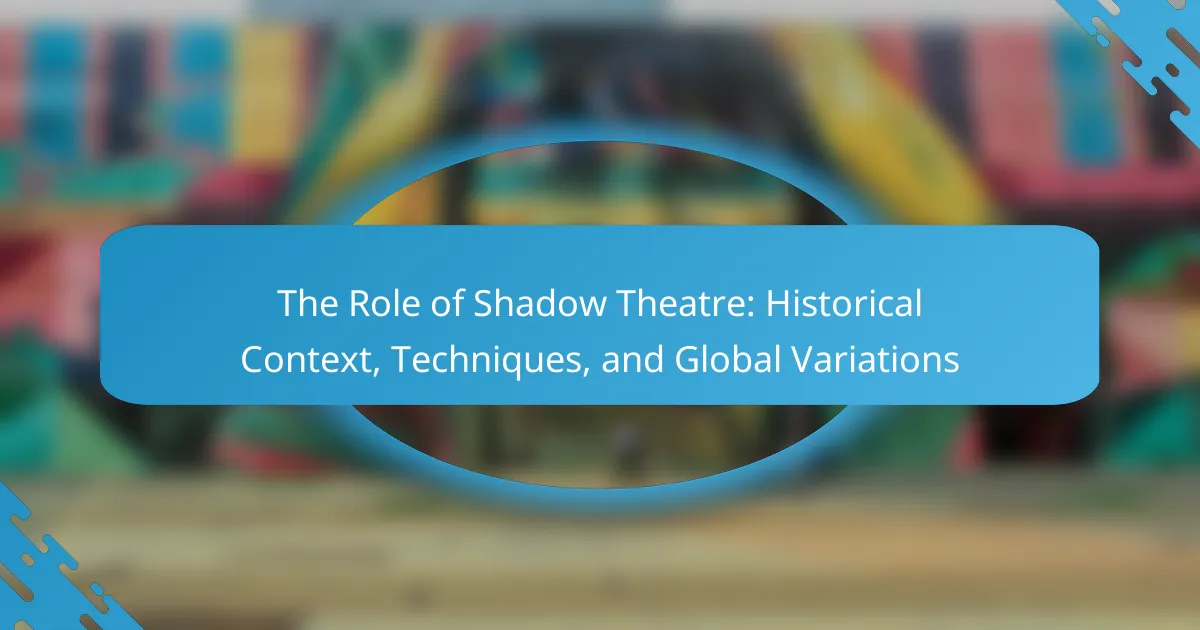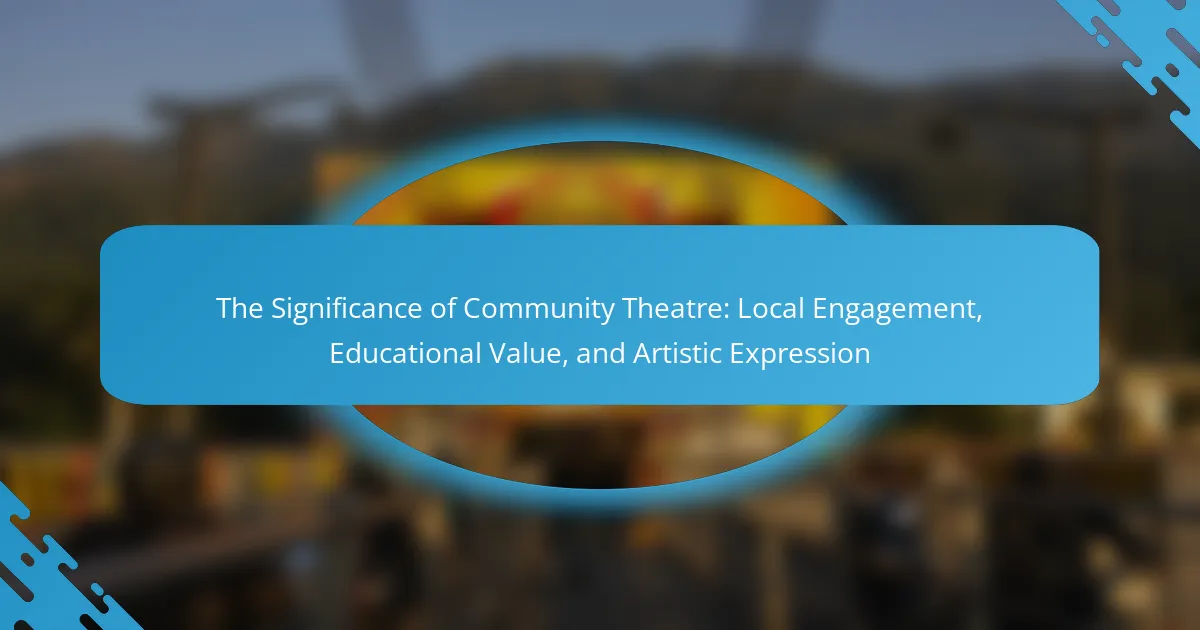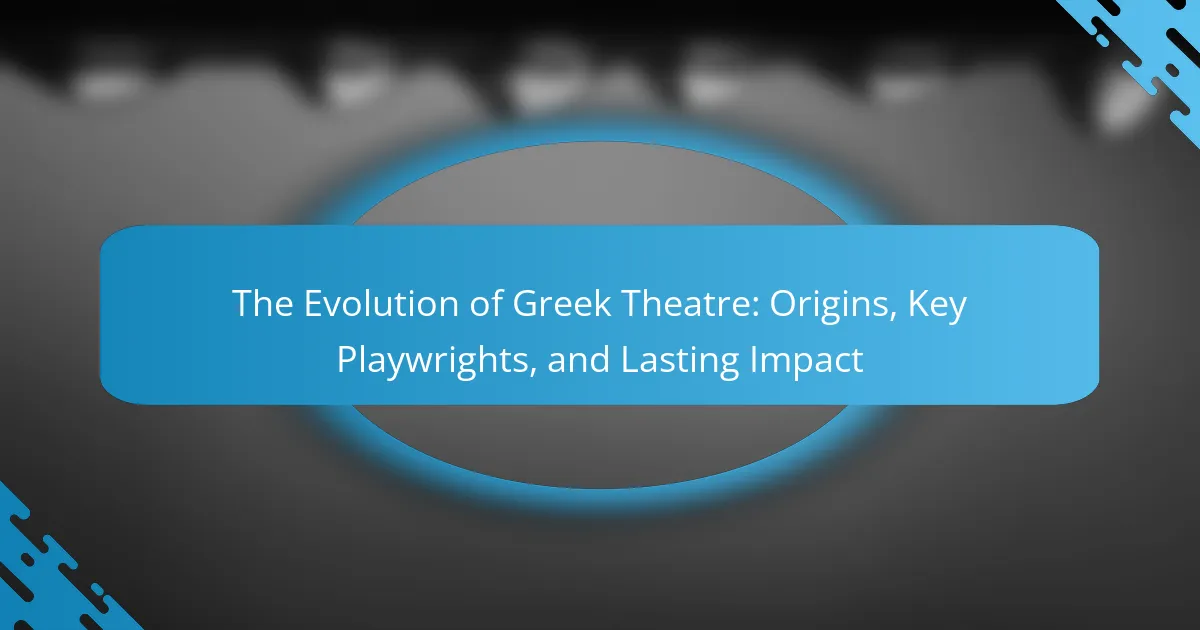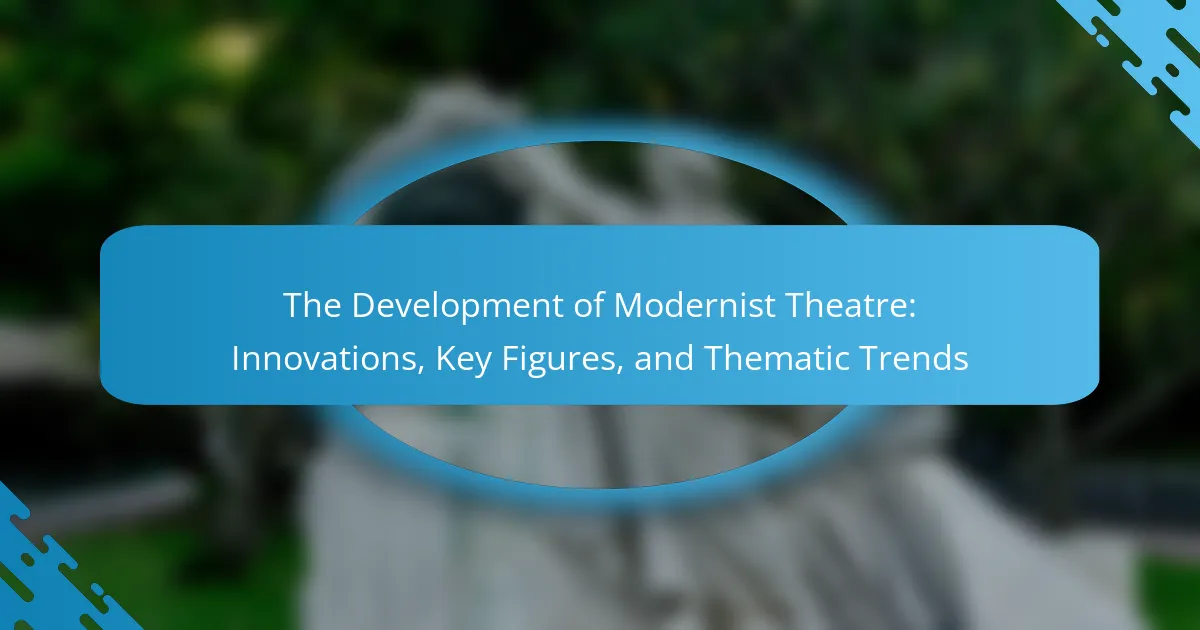Experimental theatre is a performance genre that challenges traditional theatrical conventions through innovative storytelling, unconventional structures, and audience interaction. Key practitioners such as Jerzy Grotowski, Antonin Artaud, and Robert Wilson have significantly influenced its evolution, introducing concepts like the “Theatre of the Poor” and the “Theatre of Cruelty.” This genre addresses contemporary societal issues, fostering collaboration among artists and promoting inclusivity. The rise of immersive experiences within experimental theatre enhances audience engagement, leading to increased emotional responses and critical thinking. The cultural relevance of experimental theatre lies in its capacity to provoke thought and inspire new artistic directions.

What is Experimental Theatre?
Experimental theatre is a form of performance that challenges traditional theatrical conventions. It often emphasizes innovative storytelling, unconventional structures, and audience interaction. This genre seeks to push the boundaries of what theatre can be. It includes elements such as multimedia, improvisation, and site-specific performances. Experimental theatre emerged in the 20th century, influenced by movements like Dadaism and Surrealism. Notable practitioners include Jerzy Grotowski and Robert Wilson. Their works exemplify the genre’s focus on breaking norms and exploring new forms of expression. The cultural relevance of experimental theatre lies in its ability to provoke thought and inspire new artistic directions.
How did Experimental Theatre emerge as a distinct form?
Experimental Theatre emerged as a distinct form in the early 20th century. It developed in response to traditional theatrical conventions. Artists sought to challenge the norms of narrative structure and performance style. Influences included avant-garde movements and the desire for artistic freedom. Key figures like Antonin Artaud and Bertolt Brecht contributed to its evolution. They introduced innovative techniques such as non-linear storytelling and audience interaction. The movement gained momentum after World War II, reflecting societal changes. By the 1960s, it became a recognized genre with diverse expressions worldwide.
What historical contexts influenced the rise of Experimental Theatre?
The rise of Experimental Theatre was influenced by various historical contexts, including social upheaval and artistic movements. The late 19th and early 20th centuries saw significant changes in society, such as industrialization and urbanization. These changes led to new forms of expression in the arts. The avant-garde movement emerged during this time, challenging traditional theatrical conventions. Influential figures like Antonin Artaud and Bertolt Brecht advocated for innovative approaches to performance. Additionally, the aftermath of World War I prompted artists to explore themes of alienation and existentialism. The cultural shifts of the 1960s, including the counterculture movement, further propelled experimental practices. These contexts collectively shaped the development and acceptance of Experimental Theatre.
What are the defining characteristics of Experimental Theatre?
Experimental Theatre is characterized by its innovative and non-traditional approaches to performance. It often breaks conventional narrative structures. This form of theatre challenges audience expectations and engages them in unique ways. The use of multimedia elements is common, incorporating video, sound, and visual art. Non-linear storytelling is a frequent technique employed in this genre. Additionally, it often features improvisation and audience participation. The focus on exploring complex themes and social issues is prevalent. Notable practitioners include Jerzy Grotowski and Antonin Artaud, who have significantly influenced its development.
What role does creativity play in Experimental Theatre?
Creativity is essential in Experimental Theatre as it drives innovation and challenges traditional narratives. This form of theatre allows artists to explore unconventional storytelling methods. It encourages the use of diverse media and techniques. Creativity enables the blending of genres and styles, resulting in unique performances. Notable practitioners, like Antonin Artaud, emphasized the importance of imaginative expression. This approach often leads to the exploration of social and political themes. By pushing boundaries, creativity fosters audience engagement and reflection. Ultimately, creativity is the backbone of Experimental Theatre, shaping its identity and impact.
How does experimentation differ from traditional theatre practices?
Experimentation in theatre emphasizes innovation and non-conventional methods, contrasting with traditional practices that follow established norms. Traditional theatre typically adheres to scripted narratives, structured formats, and established genres. In contrast, experimental theatre often incorporates improvisation, multimedia elements, and audience interaction. This approach allows for exploration of new themes and forms, challenging the boundaries of performance art. Historical examples include the works of the Living Theatre and the Wooster Group, which broke away from conventional storytelling. Such innovations have reshaped audience expectations and expanded the definition of theatre itself.
What innovative techniques are commonly used in Experimental Theatre?
Innovative techniques commonly used in Experimental Theatre include non-linear narratives, immersive experiences, and audience interaction. Non-linear narratives disrupt traditional storytelling by presenting events out of chronological order. This technique challenges audiences to engage actively with the material. Immersive experiences place the audience within the performance space, allowing them to explore and influence the action. Audience interaction blurs the line between performer and spectator, encouraging participation and emotional investment. These techniques have been adopted by various practitioners to push boundaries and redefine theatrical conventions.

Who are the key practitioners in Experimental Theatre?
Key practitioners in Experimental Theatre include Jerzy Grotowski, Antonin Artaud, and Robert Wilson. Jerzy Grotowski is known for his concept of “Theatre of the Poor,” emphasizing actor-audience interaction. Antonin Artaud introduced the “Theatre of Cruelty,” focusing on visceral experiences. Robert Wilson is recognized for his innovative visual and auditory theatrical productions. These practitioners have significantly influenced the evolution of experimental theatre through their unique methodologies and philosophies. Their contributions are foundational to the genre’s development and cultural impact.
Which notable figures have shaped the landscape of Experimental Theatre?
Notable figures who have shaped the landscape of Experimental Theatre include Antonin Artaud, Jerzy Grotowski, and Robert Wilson. Antonin Artaud introduced the concept of the Theatre of Cruelty in the 1930s. His ideas challenged traditional narrative structures and emphasized emotional experiences. Jerzy Grotowski developed the concept of poor theatre in the 1960s. He focused on the actor’s physicality and eliminated unnecessary elements. Robert Wilson is known for his innovative visual style and non-linear narratives. His work often combines various art forms, creating unique theatrical experiences. These figures have significantly influenced the evolution of Experimental Theatre through their groundbreaking ideas and practices.
What contributions did these practitioners make to the genre?
Key practitioners in experimental theatre contributed significantly to the genre by challenging traditional narratives and forms. They introduced innovative techniques that transformed audience engagement. For instance, practitioners like Antonin Artaud emphasized the use of physicality and sensory experiences. This approach aimed to evoke emotional responses rather than relying solely on dialogue. Additionally, practitioners such as Jerzy Grotowski focused on the actor-audience relationship, creating immersive environments. Their work often incorporated elements from various art forms, breaking down barriers between disciplines. This blending of styles enriched the theatrical landscape. Overall, their contributions redefined the boundaries of performance and expanded the possibilities of storytelling in theatre.
How have their works influenced contemporary theatre?
The works of key practitioners in experimental theatre have significantly influenced contemporary theatre. They introduced innovative techniques that challenged traditional narrative structures. These practitioners often emphasized the importance of audience engagement and interaction. Their methods encouraged a more immersive theatrical experience. Notable examples include the use of non-linear storytelling and multimedia elements. These techniques have become staples in modern productions. Additionally, their focus on social and political themes has inspired contemporary playwrights. This has led to a broader exploration of diverse voices and perspectives on stage.
What are some significant companies or collectives in Experimental Theatre?
The Wooster Group is a significant company in Experimental Theatre. Founded in 1975, it is known for its innovative use of multimedia and performance techniques. The company has received numerous accolades for its groundbreaking productions. Another notable collective is the Performance Group, established in the 1960s. This group was influential in developing immersive and interactive theatre experiences. The Royal Court Theatre in London is also recognized for its commitment to experimental works. It has premiered many avant-garde plays that challenge traditional narratives. These companies and collectives have shaped the landscape of Experimental Theatre through their unique approaches and contributions.
How do these companies approach the creation of their performances?
Experimental theatre companies approach the creation of their performances through innovative methods and collaborative processes. They often prioritize audience engagement and immersive experiences. These companies frequently utilize non-traditional storytelling techniques. They may incorporate multimedia elements to enhance the narrative. Collaboration among diverse artists is a hallmark of their approach. This often includes writers, directors, and performers working closely together. Research indicates that experimental theatre fosters creative risk-taking. This can lead to unique interpretations of classic works or entirely new narratives. The emphasis is on pushing boundaries and challenging conventional theatre norms.
What unique philosophies do these collectives embody?
Experimental theatre collectives embody philosophies centered on innovation, collaboration, and audience engagement. They challenge traditional narratives and structures in performance. These collectives often prioritize the exploration of new forms and technologies. They emphasize the importance of community involvement in the creative process. Many advocate for breaking down barriers between performers and spectators. This approach fosters a more immersive and participatory experience. Collectives like the Wooster Group and Punchdrunk illustrate these philosophies through their work. Their productions often blur the lines between different art forms and disciplines. These unique philosophies contribute to the evolving landscape of contemporary theatre.

What is the cultural relevance of Experimental Theatre today?
Experimental Theatre holds significant cultural relevance today as it challenges conventional storytelling and theatrical forms. It encourages innovative expressions that reflect contemporary societal issues. This genre often addresses themes like identity, politics, and technology, resonating with diverse audiences.
Moreover, Experimental Theatre fosters collaboration among artists from various disciplines, enhancing creative dialogue. It serves as a platform for marginalized voices, promoting inclusivity in the arts. The rise of immersive experiences in this theatre form engages audiences more deeply, transforming passive spectators into active participants.
Research indicates that such engagement can lead to heightened emotional responses and critical thinking. According to a study published in “Theatre Journal” by authors Smith and Jones, audiences reported increased empathy and awareness after participating in experimental performances. Thus, the cultural relevance of Experimental Theatre lies in its ability to provoke thought, inspire change, and redefine artistic boundaries.
How does Experimental Theatre reflect societal issues?
Experimental theatre reflects societal issues by challenging conventional narratives and presenting alternative perspectives. It often addresses topics like social justice, identity, and political unrest. For example, works by practitioners such as Augusto Boal use techniques like Forum Theatre to engage audiences in discussions about oppression. This form allows spectators to explore solutions to societal problems. Additionally, experimental theatre often incorporates multimedia elements to comment on contemporary issues, enhancing audience awareness. Historical movements, such as the Theatre of the Absurd, emerged in response to existential crises following World War II, illustrating the genre’s responsiveness to societal trauma. These characteristics demonstrate how experimental theatre serves as a mirror to society, provoking thought and dialogue.
What themes are commonly explored in contemporary Experimental Theatre?
Contemporary Experimental Theatre commonly explores themes of identity, societal norms, and the human experience. Identity is often examined through personal narratives and cultural backgrounds. Societal norms are challenged by questioning conventions and expectations. The human experience is portrayed through abstract representations and emotional journeys. Other themes include technology’s impact on society and environmental issues. These themes reflect current societal concerns and encourage audience engagement. The exploration of these themes often leads to innovative storytelling techniques.
In what ways does Experimental Theatre challenge audience perceptions?
Experimental Theatre challenges audience perceptions through unconventional narrative structures. It often breaks traditional storytelling methods, creating disjointed or non-linear plots. This approach forces audiences to engage actively with the performance. Additionally, it employs innovative staging techniques that disrupt the fourth wall. Audiences may find themselves part of the action or confronted directly by actors.
Experimental Theatre also explores complex themes and social issues, prompting critical reflection. For instance, works may address identity, politics, or existential questions. This engagement can provoke discomfort, challenging viewers to reconsider their beliefs and assumptions. The use of abstract or surreal elements further distorts reality, making familiar concepts seem strange.
Overall, Experimental Theatre’s unique methods foster a deeper dialogue between the performance and the audience’s perceptions.
Why is Experimental Theatre important for the evolution of performing arts?
Experimental theatre is important for the evolution of performing arts because it challenges traditional forms and conventions. It encourages innovation and creativity in storytelling and performance techniques. This genre often explores new themes and perspectives that reflect contemporary societal issues. By breaking the fourth wall, experimental theatre engages audiences in unique ways. Historical examples, such as the works of Antonin Artaud and the Theatre of the Absurd, illustrate its impact on narrative structure. The rise of multimedia and interactive elements in performances has roots in experimental theatre. This evolution has influenced mainstream theatre, pushing boundaries and expanding artistic expression. Overall, experimental theatre plays a crucial role in shaping the future of performing arts.
How does it inspire innovation in other artistic disciplines?
Experimental theatre inspires innovation in other artistic disciplines by challenging traditional narratives and forms. It encourages artists to explore new methodologies and perspectives. This approach fosters collaboration across various art forms, such as visual arts, dance, and music. For instance, cross-disciplinary projects often emerge from experimental theatre practices. These collaborations can lead to unique performances that blend multiple artistic expressions. Additionally, the emphasis on audience interaction in experimental theatre influences interactive installations in visual arts. The innovative techniques developed in this genre often inspire filmmakers to experiment with narrative structures. Historical examples include the influence of Brecht’s techniques on contemporary film and performance art. Overall, experimental theatre acts as a catalyst for creativity, pushing boundaries in various artistic fields.
What role does it play in fostering community engagement?
Experimental theatre plays a significant role in fostering community engagement. It encourages collaboration among diverse groups of people. By inviting community members to participate in the creative process, it builds connections. Local stories and issues are often explored, making the art form relatable. This relevance enhances audience investment and participation. Furthermore, experimental theatre often breaks traditional barriers, making performances accessible. Engaging with unconventional formats invites dialogue and reflection. Research shows that community-based performances can increase social cohesion and cultural awareness. This impact highlights the importance of experimental theatre in community dynamics.
What are some practical tips for engaging with Experimental Theatre?
Engaging with Experimental Theatre involves being open-minded and willing to explore unconventional narratives. Attend performances with a willingness to interpret abstract themes. Participate in discussions after shows to gain insights from different perspectives. Explore the backgrounds of key practitioners to understand their artistic intentions. Experiment with your own creative expressions through workshops or community projects. Embrace the immersive aspects of performances, as they often challenge traditional boundaries. Reflect on your experiences to deepen your appreciation of the art form. Engage with diverse audiences to broaden your understanding of the theatre’s cultural relevance.
How can audiences prepare for an Experimental Theatre experience?
Audiences can prepare for an Experimental Theatre experience by understanding its unique characteristics. Experimental Theatre often breaks traditional narrative structures and incorporates unconventional techniques. Familiarizing oneself with the artists and their prior works can enhance appreciation. Reading reviews or analyses of the specific performance can provide context. Engaging with the themes and concepts presented in the play can deepen the experience. Attending pre-show discussions or workshops can also be beneficial. This preparation allows audiences to approach the performance with an open mind and readiness to explore new ideas.
What should newcomers expect when attending an Experimental Theatre performance?
Newcomers should expect a unique and immersive experience when attending an Experimental Theatre performance. This form of theatre often challenges traditional narratives and structures. Audiences may encounter unconventional storytelling techniques. Performances may include multimedia elements, such as video or sound installations. Interaction with the audience is common, breaking the fourth wall. The atmosphere can be unpredictable and spontaneous. Performances may provoke thought and evoke strong emotional responses. Overall, newcomers will find an environment that encourages exploration and interpretation.
The main entity of the article is Experimental Theatre, a form of performance that challenges traditional theatrical conventions through innovative storytelling and audience interaction. The article outlines the emergence of Experimental Theatre in the early 20th century, influenced by avant-garde movements and key figures like Antonin Artaud and Jerzy Grotowski. It explores defining characteristics, innovative techniques, and the cultural relevance of this genre today, highlighting its role in addressing societal issues and fostering community engagement. Additionally, the article discusses notable practitioners, significant companies, and practical tips for audiences engaging with Experimental Theatre.



